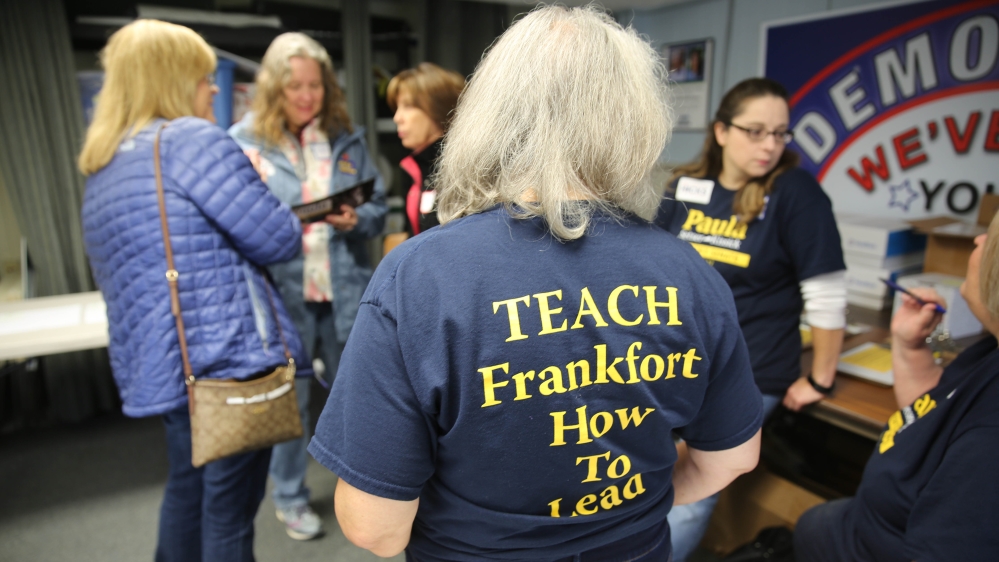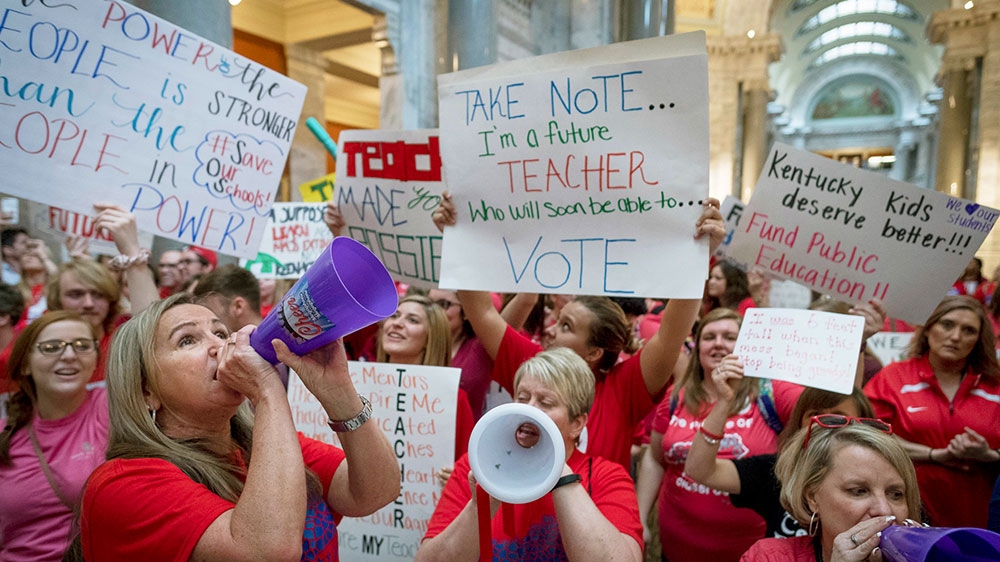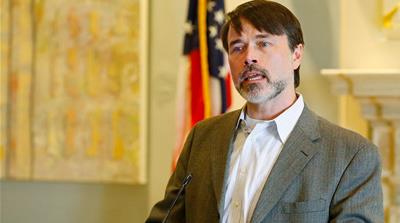US teachers running in midterms: I hope we’re at a tipping point
Lexington, Kentucky – Paula Setser-Kissick gripped a handful of campaign brochures and strode up to a potential voter’s door on a tree-filled Kentucky neighbourhood dotted with political yard signs.
“Hi, I’m a Fayette County teacher and a first-time candidate,” said Setser-Kissick, a 29-year Lexington public school technology teacher, using an introduction meant to disarm residents sceptical of politics.
Just weeks ahead of the pivotal midterm elections, 53-year-old Setser-Kissick is among a national wave of educators entering the final stretches of campaigns that grew out of this year’s high-profile teacher protests and walkouts in West Virginia, Kentucky, West Virginia, Arizona and Oklahoma over low teacher pay and school funding.
More than 1,450 educators including current and former classroom teachers, school staff, administrators and some in higher education are running for US state legislative seats in November, according to a National Education Association analysis, compared to no more than a few hundred in previous elections. That includes at least 158 current classroom teachers like Setser-Kissick. Educators are also running for Congress or statewide offices. Of the total, about 70 percent are Democrats.
Stephen Voss, a University of Kentucky political science professor, said that “the rate at which we’ve seen teachers run this election is really out of the ordinary”.
 |
| More than 1,450 educators including current and former classroom teachers, school staff, administrators and some in higher education are running for US state legislative seats in November [Chris Kenning/Al Jazeera] |
But many of the candidates are running in traditionally red states and will have to persuade some Republican voters that education is a top issue. Republican groups argue the numbers won’t be enough to tilt statehouses to the level of spending favoured by some Democrat candidates.
“While Democrat teachers may have earned a participation ribbon for filing to for office this year, Republicans have a sizable force of educators that will win this cycle,” said Republican State Leadership Committee spokesman David James, noting Republicans control 67 of 99 state legislative chambers.
Frustrations among educators
Frustrations among educators reached a boiling point earlier this year after what they said was years of budget cuts and low pay, rising healthcare costs or proposed pension changes, all amid an era of increased demands from school accountability testing that began with No Child Left Behind, a federal education law signed by George W Bush in 2001.
A string of protests started in West Virginia in February, when thousands of teachers after years without raises walked out of their schools for nine days, demanding better pay. The state legislature eventually gave them a five percent pay hike. But some educators said wasn’t enough, prompting some first-time teachers to run for office.
Arizona teachers also walked out over pay and funding, keeping students out of school for six days. Politicians later passed a budget that authorised a 20 percent teacher pay increase by 2020 signed by the governor in May, but candidates say it fell short of demands.
“I have a master’s degree and I’ve been teaching for a decade, and I just climbed over the $40,000 mark,” said Jennifer Samuels, 39, a teacher at Desert Shadows Middle School in Scottsdale, Arizona, who is running for a state House seat. “I never thought I’d have to run for office, but my elected leaders are not protecting public schools.”
 |
| Teachers from across Kentucky gathered inside the state Capitol building in Frankfort to rally for increased funding for education [File: Bryan Woolston/AP Photo] |
Educators saw some hopeful signs in earlier primaries. While some Kentucky educators lost primaries, first-time candidate Travis Brenda, a Rockcastle County high school math teacher, won a Republican primary against the Kentucky House majority leader who backed pension reform proposal that helped sparked teacher protests.
In April, Kentucky politicians overrode a veto by Governor Matt Bevin to pass new spending for public education with the help of a 50-cent increase on a cigarette tax. But even some Republican educator candidates are pressing their education message even if it means going against such party leaders such as Bevin.
“Support for [US President Donald] Trump is high here,” said Scott Lewis, 57, the superintendent of a 4,100-student Ohio County Public Schools in rural western Kentucky, who won a Republican primary by arguing his party wasn’t properly funding schools. “But I really do think we missed the boat on public education. Teachers want to teach, and they don’t want to complain. But with everything accumulating, and that’s why you see the protests and so many running for office.”
‘You know why I’m at your door’
John Waldron, a teacher at Booker T Washington High in Tulsa, Oklahoma, and marched to the state Capitol in protest in April, is making his second attempt at office.
 |
| It’s John Waldron’s second attempt at office [File: Sue Ogrocki/AP Photo] |
“You know why I’m at your door,” Waldron tells voters as he campaigns for a state senate seat in Tulsa, promising to raise inadequate school funding that earlier this year sparked statewide walkouts and made national headlines. “And they say, ‘Oh, we know.’ It’s like I’m coming to collect overdue homework.”
He said educator salaries, including school support staff, are too low even with the state’s agreement to raise teacher pay by $6,100. He’s funding his campaign of yard signs and mailers with about $150,000 in donations, he said
“The governor called us spoiled teenagers,” he said of two weeks of walkouts and the fallout. “We had candidates filing in races that hadn’t been contested in years.”
Waldron said he is realistic about the impact of the wave of educators running in Oklahoma. “A Republican-dominated legislature is not going to change overnight, but we’re going to move the needle,” he said.
Meanwhile, on the campaign trail, candidates say their message seems to be gaining traction.
Back in Kentucky, Professor Voss said research shows Republicans voters view education spending more favourably than other forms of domestic spending. And he said there’s a personal connection that comes with being an educator. “They’ve had teachers they loved, many have children in school, so they can have a vested interest in teachers,” he said.
Setser-Kissick, who is running as a Democrat for a Republican-held state Senate seat, spent some time juggling a full-time job for most of the campaign season, hitting the pavement right after work.
Her campaign had recently raised close to $40,000. She said the numbers of Democrats running has diluted some of the available donor funding. But she views her run as part of newfound political clout for educators, whether or not she wins.
“I was cynical about politics. I was like why would anybody do that? Now I’m knocking on doors,” she said. “I hope we’re at a tipping point.”




